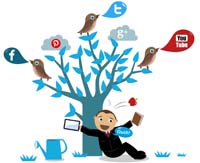As a growing epidemic, obesity has attracted the attention of scientists, researchers, government officials and Coca-Cola.
Yes, Coca-Cola. The company?s new ad campaign, ?Coming Together,? released on Jan. 14, addresses the problem of obesity, creating widespread dissent in the scientific community.
?Coke, like other companies, is in the crosshairs,? said Jeff Cronin, director of communications at the Center for Science in the Public Interest.
?Sugary drinks are alike in that they have no nutritional value, but promote things like heart disease, diabetes, and obesity,? he said.
"Coming Together? directly confronts questions of Coca-Cola?s role in the obesity epidemic and cites ways the company has improved the health content of its beverages.
?Across our portfolio of more than 650 beverages, we now offer over 180 low- and no-calorie choices,? the ad says, ?Over the last 15 years, this helped reduce the average calories per serving across our industry?s products in the U.S. by 22 percent.?
The ad also cites smaller, portion-controlled, sizes and calorie-content labels on its products as ways the company has responded to obesity.
?No matter how much water, juice or seltzer is in their portfolio,? Cronin said, ?the core of their business is selling full-calorie Coke.?
However, even low-calorie sodas could contribute to weight gain and illness, said Brenda Murray, bariatric dietician at the University of Illinois at Chicago.
?Soda acts the same way as if you ate a lot of white bread or rice,? she said. ?It?s processed right into fat in the body, and all you?re getting is empty calories, no nutrition.?
Murray emphasized the importance of quality over quantity when consuming food and beverages. A healthy diet could include bigger portions of a higher quality food, rather than smaller portions of a lower quality food or beverage.
?They?re saying a calorie is just a calorie. But it?s not the amount of calories you take in, it?s the kind of calories, too,? Murray said.
In response to the statements made in Coca-Cola?s ad, the Center for Science in the Public Interest released a video, ?Coming Together: Translated.? The video includes excerpts from Coca-Cola?s original ad, with ?translations? exposing the ad?s underlying messages.
?We thought the ad was laughable on its face,? Cronin said. ?What we wanted to do was to translate what Coke was saying into plain English.?
The ?translations? are written as if spoken by Coca-Cola executives, and respond directly to statements in the original ad. For example, the original ad tells consumers, ?If you eat and drink more calories than you burn off, you?ll gain weight,? which the Center for Science in the Public Interest translates into, ?If you gain weight, remember it?s your fault and not ours.?
Cronin compared Coca-Cola?s influence on the American public to that of the tobacco industry in the past two decades. He specifically cited statements made by Coca-Cola President Katie Bayne in 2012 that claim no evidence connects sugary drinks to obesity.
?Katie Bayne?s comments are like a tobacco executive swearing under oath that nicotine is not addictive,? Cronin said. ?It?s like Coke is in denial.?
Professor Tim Calkins at Northwestern University?s Kellogg School of Management also compared Coca-Cola?s behavior to that of tobacco companies, but in a different sense.
?The executives at Coke have to be very concerned about the focus of soda on the risk of obesity,? Calkins said. ?Like the tobacco industry and other industries that have been scrutinized, they could be stigmatized as a bad product.?
Especially in light of stricter regulations on soda imposed by some government officials, soda companies feel obligated to engage in the discussion about obesity, Calkins said.
?Coke doesn?t want to be identified as the main problem,? Calkins said. ?It?s tempting to sit back and be quiet and think that it will all work out, but that?s not the best approach.
Mary Pearlman, another professor at Kellogg, agreed with Calkins that Coca-Cola needs to address the issue rather than ignoring it.
?If you?re going to toot your horn about how you?ve increased the number of options available with fewer calories, you?re opening the door for either questions or comments about the product in general,? Pearlman said.
Coca-Cola did not respond to requests for comment.
Calkins said this is not the last time the soda industry will respond to obesity.
?I think we?re going to see more of this. As obesity comes to the fore, more and more companies will take action,? Calkins said.
More than one-third of U.S. adults are obese, and in 2008 alone, medical costs associated with obesity were estimated at $147 billion, according to the Centers for Disease Control and Prevention.
###
by Emily Wasserman
Chicago, Northwestern University
Provided by ArmMed Media
| ?Comments | [ + Post Your Own ]? |
Now you're in the public comment zone. What follows is not Armenian Medical Network's stuff; it comes from other people and we don't vouch for it. A reminder: By using this Web site you agree to accept our Terms of Service. Click here to read the Rules of Engagement.
There are no comments for this entry yet. [ + Comment here + ]

Source: http://www.health.am/ab/more/cokes-new-obesity-ad-raises/
Mcdonalds Restaurants Open on Christmas Day jessica simpson santa tracker happy holidays Stores Open On Christmas Day Santa Claus




 How do I create a podcast and make money? Nowadays this question is becoming more and more popular. If you have ever listened to, or subscribed to, a podcast, then you already know how convenient they are. You simply subscribe to the podcast, and it is downloaded as updates are available. Then, you can listen to the podcasts at your convenience, regardless of whether you are online or offline.
How do I create a podcast and make money? Nowadays this question is becoming more and more popular. If you have ever listened to, or subscribed to, a podcast, then you already know how convenient they are. You simply subscribe to the podcast, and it is downloaded as updates are available. Then, you can listen to the podcasts at your convenience, regardless of whether you are online or offline.
 In podcasting, ?setting the stage? is a metaphor for deciding how your podcast is going to be formatted. Will you be speaking alone? Will you be engaging in dialogue with someone else? Will you be adding music to enhance the podcast? The possibilities are only limited by the boundaries of your imagination. There are no legalities to restrict your creativity with one exception: if you do plan to use music in your podcast, make sure that you have all of the appropriate permissions from the artist(s) and recording companies. Or, if you have musical talent, you may simply create your own music.
In podcasting, ?setting the stage? is a metaphor for deciding how your podcast is going to be formatted. Will you be speaking alone? Will you be engaging in dialogue with someone else? Will you be adding music to enhance the podcast? The possibilities are only limited by the boundaries of your imagination. There are no legalities to restrict your creativity with one exception: if you do plan to use music in your podcast, make sure that you have all of the appropriate permissions from the artist(s) and recording companies. Or, if you have musical talent, you may simply create your own music.
 You can get your hands on a fairly reasonable condenser studio mic for as little as $200 USD with a wind muff to stop those ?pff? sounds when you blow or speak loudly into the mic. It also pays to purchase an MBox or a good quality sound card for your computer, this will allow you to record your podcast in CD quality (320kbps). You will need a mixer to run your Mic?s through, just make sure the mixer has ?Phantom Power?, to power your condenser mic. A mixer is also great for expanding out the number of mic?s as you introduce more guests on your show.
You can get your hands on a fairly reasonable condenser studio mic for as little as $200 USD with a wind muff to stop those ?pff? sounds when you blow or speak loudly into the mic. It also pays to purchase an MBox or a good quality sound card for your computer, this will allow you to record your podcast in CD quality (320kbps). You will need a mixer to run your Mic?s through, just make sure the mixer has ?Phantom Power?, to power your condenser mic. A mixer is also great for expanding out the number of mic?s as you introduce more guests on your show. Make sure your environment is as comfortable as possible and really set the scene, put up a funny poster ,an awesome view of Manhattan or a canvas print of Muhammad Ali knocking out his competition to inspire your thoughts while podcasting, it?s all really up to personal preference. Famous Podcaster, ?Joe Rogan? even has mannequins with ?Storm Trooper? helmets on them to jazz up his studio. Let your imagination run free and create a cool vibe in the room.
Make sure your environment is as comfortable as possible and really set the scene, put up a funny poster ,an awesome view of Manhattan or a canvas print of Muhammad Ali knocking out his competition to inspire your thoughts while podcasting, it?s all really up to personal preference. Famous Podcaster, ?Joe Rogan? even has mannequins with ?Storm Trooper? helmets on them to jazz up his studio. Let your imagination run free and create a cool vibe in the room. This part is just as important as creating your podcast itself. How is anyone going to hear your podcast if you keep it all to yourself? Add a ?Get on Youtube, Twitter, Facebook, Google+ and start promoting your show and posting snippets of your clips. Create a community on Google+ that is aligned with what you talk about and start discussions with those like-minded people so that you can share your show with them also.
This part is just as important as creating your podcast itself. How is anyone going to hear your podcast if you keep it all to yourself? Add a ?Get on Youtube, Twitter, Facebook, Google+ and start promoting your show and posting snippets of your clips. Create a community on Google+ that is aligned with what you talk about and start discussions with those like-minded people so that you can share your show with them also.




